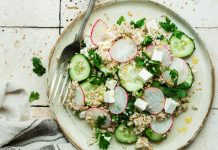
Managing liver disease often involves careful attention to diet and exercise.
Since the liver plays a crucial role in processing nutrients, detoxifying harmful substances, and producing bile to aid in digestion, supporting its health through lifestyle changes can make a significant difference.
This review will explore how diet and exercise impact liver health and can help manage liver diseases.
The liver can be affected by various conditions, such as fatty liver disease, hepatitis, and cirrhosis. These conditions can worsen over time if not managed properly, leading to serious health issues.
Research suggests that certain dietary choices and physical activities can help prevent the progression of liver disease and improve overall liver function.
Dietary Management
Diet plays a pivotal role in managing liver disease. A healthy liver diet focuses on several key elements: reducing fat intake, especially saturated fat; increasing fiber through fruits, vegetables, and whole grains; and incorporating healthy proteins.
These adjustments can help reduce liver fat, inflammation, and improve liver enzyme levels.
One of the most common recommendations for liver health is to reduce the intake of alcohol significantly or avoid it altogether, as alcohol can cause liver inflammation and damage.
For non-alcoholic fatty liver disease (NAFLD), reducing sugar, especially fructose found in sugary drinks and snacks, is crucial because it can contribute to fat buildup in the liver.
There is also evidence that coffee, rich in antioxidants, may have a protective effect on the liver. Studies suggest that regular coffee consumption can lower the risk of cirrhosis, especially alcoholic cirrhosis, and may reduce the risk of liver cancer.
The Role of Exercise
Physical activity is another critical factor in managing liver disease. Exercise helps burn triglycerides for fuel and can reduce liver fat.
Regular exercise, including both aerobic activities like walking or cycling and resistance training, can help improve liver enzyme levels and manage symptoms of liver disease.
Research has shown that even moderate exercise routines can have significant benefits for people with liver disease. A study found that regular moderate exercise reduces liver fat in people with NAFLD, even without weight loss.
This indicates that the benefits of exercise are not solely tied to losing weight but also involve improving metabolic health and reducing liver fat directly.
Practical Tips
For those managing liver disease, the combination of a healthy diet and regular exercise can be powerful. Here are some practical tips:
- Choose lean proteins like fish, poultry, and plant-based sources to reduce fat intake.
- Increase fiber intake by eating more vegetables, fruits, and whole grains which can help manage weight and reduce liver fat.
- Limit high-calorie foods and sugars, particularly refined sugars and grains, as they contribute to liver fat accumulation.
- Stay hydrated to help the liver function more efficiently.
- Exercise regularly. Aim for at least 150 minutes of moderate-intensity aerobic activity each week, along with muscle-strengthening activities on two or more days a week.
Consulting Healthcare Providers
It’s important to work closely with healthcare providers to tailor diet and exercise plans to individual needs, especially when dealing with liver disease.
Adjustments might be necessary based on the specific type of liver disease, its progression, and any other health issues.
In conclusion, managing liver disease through diet and exercise is not only about preventing further damage but also about enhancing liver function and overall health.
Making informed lifestyle choices can significantly impact the quality of life and health outcomes for individuals with liver disease. While these changes can seem challenging, the benefits they bring in managing liver health are well worth the effort.
If you care about liver health, please read studies about a diet that can treat fatty liver disease and obesity, and coffee drinkers may halve their risk of liver cancer.
For more information about liver health, please see recent studies that anti-inflammatory diet could help prevent fatty liver disease, and results showing vitamin D could help prevent non-alcoholic fatty liver disease.
Copyright © 2024 Knowridge Science Report. All rights reserved.



